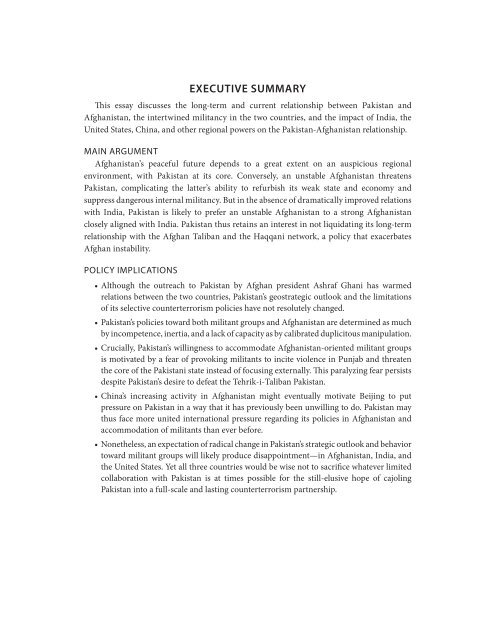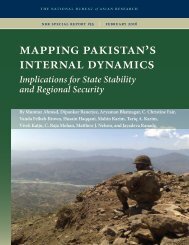pakistan’s
SR55_Mapping_Pakistan_February2016
SR55_Mapping_Pakistan_February2016
You also want an ePaper? Increase the reach of your titles
YUMPU automatically turns print PDFs into web optimized ePapers that Google loves.
EXECUTIVE SUMMARY<br />
This essay discusses the long-term and current relationship between Pakistan and<br />
Afghanistan, the intertwined militancy in the two countries, and the impact of India, the<br />
United States, China, and other regional powers on the Pakistan-Afghanistan relationship.<br />
MAIN ARGUMENT<br />
Afghanistan’s peaceful future depends to a great extent on an auspicious regional<br />
environment, with Pakistan at its core. Conversely, an unstable Afghanistan threatens<br />
Pakistan, complicating the latter’s ability to refurbish its weak state and economy and<br />
suppress dangerous internal militancy. But in the absence of dramatically improved relations<br />
with India, Pakistan is likely to prefer an unstable Afghanistan to a strong Afghanistan<br />
closely aligned with India. Pakistan thus retains an interest in not liquidating its long-term<br />
relationship with the Afghan Taliban and the Haqqani network, a policy that exacerbates<br />
Afghan instability.<br />
POLICY IMPLICATIONS<br />
• Although the outreach to Pakistan by Afghan president Ashraf Ghani has warmed<br />
relations between the two countries, Pakistan’s geostrategic outlook and the limitations<br />
of its selective counterterrorism policies have not resolutely changed.<br />
• Pakistan’s policies toward both militant groups and Afghanistan are determined as much<br />
by incompetence, inertia, and a lack of capacity as by calibrated duplicitous manipulation.<br />
• Crucially, Pakistan’s willingness to accommodate Afghanistan-oriented militant groups<br />
is motivated by a fear of provoking militants to incite violence in Punjab and threaten<br />
the core of the Pakistani state instead of focusing externally. This paralyzing fear persists<br />
despite Pakistan’s desire to defeat the Tehrik-i-Taliban Pakistan.<br />
• China’s increasing activity in Afghanistan might eventually motivate Beijing to put<br />
pressure on Pakistan in a way that it has previously been unwilling to do. Pakistan may<br />
thus face more united international pressure regarding its policies in Afghanistan and<br />
accommodation of militants than ever before.<br />
• Nonetheless, an expectation of radical change in Pakistan’s strategic outlook and behavior<br />
toward militant groups will likely produce disappointment—in Afghanistan, India, and<br />
the United States. Yet all three countries would be wise not to sacrifice whatever limited<br />
collaboration with Pakistan is at times possible for the still-elusive hope of cajoling<br />
Pakistan into a full-scale and lasting counterterrorism partnership.



